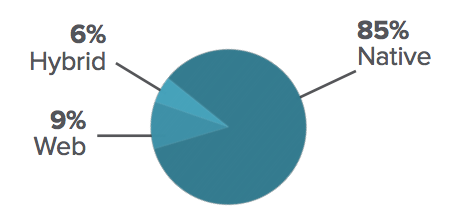According to a recent eMarketer survey, 65% of marketers use mobile apps as part of their marketing strategy. Since this number is expected to increase over the years, a lot of businesses struggle with deciding which native to hybrid app development.
Roi Kraus from LTG wrote an interesting article describing the three lessons he learned from not efficiently choosing the right platform from the beginning of his app project. The three lessons include:
- defining what your app needs to do- now and the future
- don’t let business needs outweigh user experience
- if you choose native, focus on one market first
Being a mobile app development shop, I wanted to share our opinions on Kraus’s three lessons that are useful to any type of business wanting a mobile app.
(If you’re not familiar with the differences between hybrid and native app development, we can help you out here.)
Here are three lessons Kraus learned about mobile app development:
Lesson 1: Define What Your App Needs to Do – Now, and In The Future
A lot of companies will start out with hybrid thinking it’s the best solution, then they decide later down the road they want their project to be more complex which is very difficult to do with a hybrid app. The money initially saved from the beginning by developing a hybrid app goes to waste because they now have to switch to native to develop the more complex and feature-filled app.According to Kraus at LTG, they started with hybrid, but realized they wanted more complex features after a few updates and discovered the limited restrictions they had with hybrid on updating features.
“We began hitting technological walls (with hybrid) and QA almost ground to a halt, which necessitated our switch back (to native).”Kraus’s experience points to the very reason why we encourage and help potential new clients build a roadmap when planning a new app development project.A roadmap will help your business discover all of the factors that go into development, and it will help you decide the correct approach from the beginning. Another benefit of developing a mobile app roadmap is that you can plan for future phases of your project and for what happens after your app goes to market.
If Kraus and his team had developed a roadmap, they would have realized a hybrid approach was not the correct solution for the app’s intended use. The team would have saved significant time and money by taking a native approach and gained meaningful efficiencies had they chosen better.
Lesson 2: Don’t Let Business Needs Outweigh User Experience
UX/UI (user experience, user interface) is a crucial part of the application project and development. While hybrid may be a reasonable choice if you are not building a feature-rich application, users don’t care about the technology behind an app’s front-end as long as it works and does what it is supposed to do. They care about their experience, so this is where UX/UI is crucial. According to TechCrunch, smartphone owners use around 26 apps per month and will immediately uninstall apps if the experience and interface are too slow to load, unorganized, buttons not working, etc. A native application does not have to worry about the UX/UI slowing the user down.
Matt Michelson, UX/UI designer at stable|kernel, has this to say:”Tapping into the native features of your device offers users a premium experience that you just can’t replicate in a hybrid environment.” Like Kraus, you may see taking a hybrid approach as a means to get you to deployment faster and cheaper initially, but there are several limitations to what a hybrid application has to offer in terms of designing a best-in-class user experience. UX is one important component that you should not sacrifice just to save costs or to meet unrealistic deadlines.
Related: Why UX Is More Important Than Ever
Lesson 3: If You Choose Native, Focus On One Market First

If a native development approach is the method you choose to move forward with, understanding your users and their mobile habits can make deciding which platform best suits your project goals.
You may have a large target audience and know that starting on both platforms simultaneously is the best approach. However, if you are testing a new concept or have limited funding, starting with one platform first may be the appropriate first step. For instance, if your users are mostly on Android, it would be best to start with that platform, track the success and then start planning for iOS later.
One of the many reasons teams take a hybrid approach is that hybrid apps use technologies widely understood and practiced by many developers. It’s not difficult to code in JavaScript or HTML5, and it’s not difficult to find talent.
Many organizations are finding that it is difficult to find talented, experienced native developers. You may find yourself in that situation – not having the in-house resources to undertake native development on both (or either) platforms. Outsourcing development is a great way to solve this problem because a qualified mobile app development team will complement your existing team.
“Mobile developers become experts through years of experience gained while working on various projects across different platforms and technologies across numerous industries,” according to Director of Business Development at stable|kernel Sarah Woodward.
“Peering into different scenarios gives developers unique perspectives on how to solve many different problems. Unfortunately, in-house developers are often siloed on one platform or project, creating an unintentional skills gap. This is why outsourcing mobile development is a more efficient and successful way of building a company’s app.”
Did you know? According to our survey of 500 developers, 85% of developers prefer working on native projects rather than hybrid.

Eventually, Kraus and team came to the conclusion that native was the best approach for them. “Native development matches our needs the best, and that’s the bottom line in choosing one development strategy over the other,” said Kraus.
When building a mobile app, it is important to plan out what your app needs to do, keep user experience a priority and choosing one platform if native development is right for your business. All of these things will ensure a more efficient and successful plan for your app.
